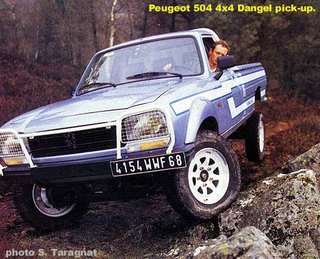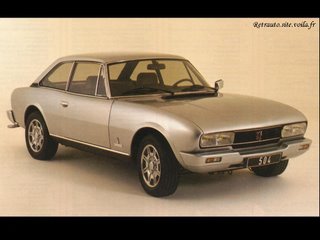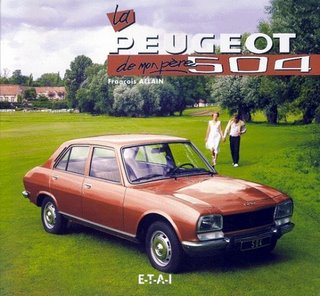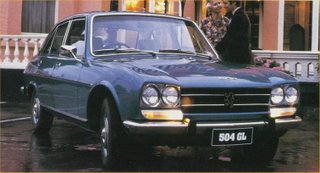





The Peugeot 504 is a mid-size car that was produced by French manufacturer Peugeot between 1968 and 1983 in Europe. It is still available to buy new in Kenya and Nigeria.The Peugeot 504 made its public debut on the 12th September 1968 at the Geneva Salon. It was a four-door Saloon, available in normal and Injection model variations, which were equipped with a 1796cc four-cylinder engine rated at 82bhp for the standard model while the Injection model gave 97bhp. Both models were available with either a four-speed manual (steering column shift) or automatic (ZF 3HP22) transmission. Both models also had a sunroof fitted as standard.
The 504 was European Car of the Year on its launch. It was praised for its modern styling, solid build quality, smooth ride, strong engines and top notch refinement.The 504 Injection two-door Coupé and two-door Cabriolet were made available to the public at the Salon de Geneva in 1969. These models were mechanically identical to the saloon version.
Available models:
504 4-door Saloon
504 Injection 4-door Saloon
504 Injection 2-door Coupé
504 Injection 2-door Cabriolet All existing 504 models received a new four-cylinder 1971cc engine, rated at 93 for the normal model and 104bhp for the Injection model.
Another new model was introduced, the 504 Diesel, which had a new four-cylinder 2112cc Diesel engine rated at 65bhp.
In September 1970, Peugeot presented the 504 wagon, being longer than the Berline, also having a longer wheelbase, a higher roof in the back and a solid rear axle with four coil springs. The wagon was available as Familiale, Break and Commerciale.
504 4-door Saloon
504 5-door Estate
504 Injection 4-door Saloon
504 Diesel 4-door Saloon
504 Injection 2-door Coupé
504 Injection 2-door Cabriolet
[edit] 1971
More than three million 504s were produced during its production in Europe, which ended in 1983. Manufacturing then moved abroad, where it continues as of 2006 in Nigeria and Kenya. The 504 was voted European Car of the Year for 1969. It replaced the 404 as Peugeot's large family saloon, and was produced as a sedan, station wagon (estate), coupe, convertible, and a pickup truck with a wide range of engines.
April 1973, Peugeot presented the 504 L due to the oil crisis. It featured a live rear axle, 1796cc engine rated at 96bhp (81bhp for Automatic).
The Peugeot 504 is also one of the most common vehicles employed as a bush taxi in Africa. It is so popular in this regard, that it is still manufactured on that continent, and can be bought brand new from Peugeot Nigeria and Peugeot Kenya.
The Peugeot 504 was also produced in Argentina until 1999, and later models were slightly restyled at the front and rear. The cars were also given a new interior.
The French company Dangel also produced Peugeot approved 4 wheel drive estate (station wagon) and pickup models.
Its engines and suspension were used in later models of the Paykan, the Iranian version of the Hillman Hunter.
Peugeot 504 production in Europe was pruned back in 1979 with the launch of the Peugeot 505, and the last European example rolled off the production line in 1983. The 505 shared most of the Peugeot 504 mechanical parts, along with the Peugeot 604 and Talbot Tagora.
The car was rear wheel drive, with longitudinally mounted engines. The suspension system consisted of MacPherson struts and coil springs at the front and with either semi-trailing arms with coil springs or coil springs and live axle. The station wagon and pickup versions were only available with a live axle. The car used disc brakes at the front, and either disc brakes or drum brakes at the rear, depending on the model. The steering was a rack and pinion system.
The Peugeot 504 was widely available with diesel engines as an option, along with an automatic transmission. Engines were of the Indenor design and included 1948cc, 2112cc, 2304cc. The Indenor engine was also used in the Peugeot 404, Peugeot 505, Peugeot 604, Ford Sierra, Mahindra Jeep, Leyland Daf 400 van.
There were two petrol engines available in Europe, a 1796cc and 1971cc. The later was also available with Kugelfischer mechanical fuel injection, first available on the Peugeot 404. Gearboxes were either the BA7, 4 speed manual or ZF 3 speed automatic. Later pickup trucks in Europe gained a 5th gear. Export market vehicles had different variations available.
The 504 was European Car of the Year on its launch. It was praised for its modern styling, solid build quality, smooth ride, strong engines and top notch refinement.The 504 Injection two-door Coupé and two-door Cabriolet were made available to the public at the Salon de Geneva in 1969. These models were mechanically identical to the saloon version.
Available models:
504 4-door Saloon
504 Injection 4-door Saloon
504 Injection 2-door Coupé
504 Injection 2-door Cabriolet All existing 504 models received a new four-cylinder 1971cc engine, rated at 93 for the normal model and 104bhp for the Injection model.
Another new model was introduced, the 504 Diesel, which had a new four-cylinder 2112cc Diesel engine rated at 65bhp.
In September 1970, Peugeot presented the 504 wagon, being longer than the Berline, also having a longer wheelbase, a higher roof in the back and a solid rear axle with four coil springs. The wagon was available as Familiale, Break and Commerciale.
504 4-door Saloon
504 5-door Estate
504 Injection 4-door Saloon
504 Diesel 4-door Saloon
504 Injection 2-door Coupé
504 Injection 2-door Cabriolet
[edit] 1971
More than three million 504s were produced during its production in Europe, which ended in 1983. Manufacturing then moved abroad, where it continues as of 2006 in Nigeria and Kenya. The 504 was voted European Car of the Year for 1969. It replaced the 404 as Peugeot's large family saloon, and was produced as a sedan, station wagon (estate), coupe, convertible, and a pickup truck with a wide range of engines.
April 1973, Peugeot presented the 504 L due to the oil crisis. It featured a live rear axle, 1796cc engine rated at 96bhp (81bhp for Automatic).
The Peugeot 504 is also one of the most common vehicles employed as a bush taxi in Africa. It is so popular in this regard, that it is still manufactured on that continent, and can be bought brand new from Peugeot Nigeria and Peugeot Kenya.
The Peugeot 504 was also produced in Argentina until 1999, and later models were slightly restyled at the front and rear. The cars were also given a new interior.
The French company Dangel also produced Peugeot approved 4 wheel drive estate (station wagon) and pickup models.
Its engines and suspension were used in later models of the Paykan, the Iranian version of the Hillman Hunter.
Peugeot 504 production in Europe was pruned back in 1979 with the launch of the Peugeot 505, and the last European example rolled off the production line in 1983. The 505 shared most of the Peugeot 504 mechanical parts, along with the Peugeot 604 and Talbot Tagora.
The car was rear wheel drive, with longitudinally mounted engines. The suspension system consisted of MacPherson struts and coil springs at the front and with either semi-trailing arms with coil springs or coil springs and live axle. The station wagon and pickup versions were only available with a live axle. The car used disc brakes at the front, and either disc brakes or drum brakes at the rear, depending on the model. The steering was a rack and pinion system.
The Peugeot 504 was widely available with diesel engines as an option, along with an automatic transmission. Engines were of the Indenor design and included 1948cc, 2112cc, 2304cc. The Indenor engine was also used in the Peugeot 404, Peugeot 505, Peugeot 604, Ford Sierra, Mahindra Jeep, Leyland Daf 400 van.
There were two petrol engines available in Europe, a 1796cc and 1971cc. The later was also available with Kugelfischer mechanical fuel injection, first available on the Peugeot 404. Gearboxes were either the BA7, 4 speed manual or ZF 3 speed automatic. Later pickup trucks in Europe gained a 5th gear. Export market vehicles had different variations available.
No comments:
Post a Comment